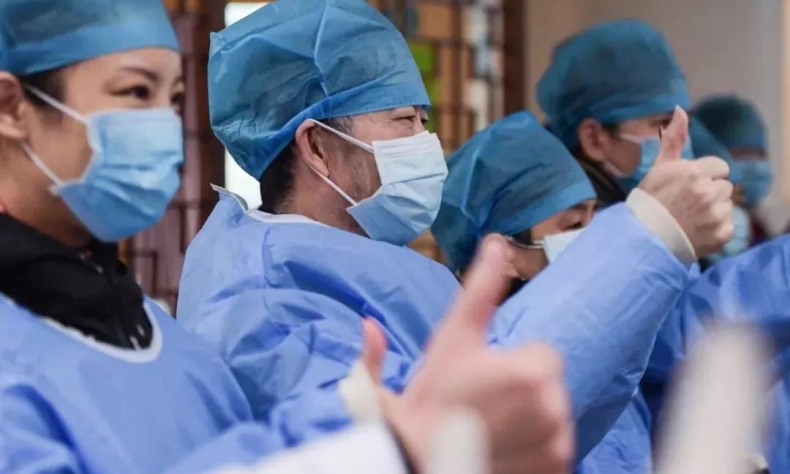Playing a Critical Role

China fulfills its responsibility as a major country in the global fight against COVID-19
When the novel coronavirus disease 2019 (COVID-19) emerged in the city of Wuhan, China took the unprecedented measure of locking it down. The efficiency of policies always depends on results. A few weeks after the outbreak, difficult decisions seem to be vindicated. Despite precaution and systematic controls that are still needed, life is gradually returning to normal. New cases are mostly imported ones, requiring airport checks and quarantine to prevent another contagion. The Guardian acknowledged China’s success by calling Wuhan’s lockdown strategy “effective”. And Time magazine asserted that “China’s draconian lockdown [is] getting credit for slowing coronavirus.”
An important part of China’s strategy was to closely collaborate with the World Health Organization (WHO). The organization’s Director General Tedros Adhanom Ghebreyesus has praised the country’s efforts to contain the virus.
While there is much discussion at present about COVID-19 by experts and non-experts, Chinese biologists and doctors–at the beginning–had to fight against an unknown virus to save lives while protecting themselves. As Chinese President Xi Jinping said during the Group of 20 (G20) leaders’ virtual meeting on March 26, the COVID-19 outbreak “caught us all by surprise.” Of course, some of the criticism is fair. The Chinese Government has acknowledged mistakes. And it has expressed gratitude to countries which immediately offered humanitarian assistance. But if there is one thing that it could barely accept, it is social stigma. Several examples can be found during the pandemic that have naturally caused anger in Beijing. The expression “Chinese virus” used by U.S. President Donald Trump is obviously the most notable one.
WHO has published a guide to prevent and address social stigma. In the context of health, it refers to the negative association between a person or group of people who share certain characteristics and a specific disease. As COVID-19 is not fully understood by most people, stereotypes tend to become a recurrent feature and are often associated with political games and the favorite theme of the Western discourse: China’s development. But if we now look back at the beginning of January, we can see that the Chinese battle against COVID-19 bought time for other countries that was not necessarily harnessed.
From the very beginning, neutral observers have not joined the anti-China trend in the West but have warned that COVID-19 respects no borders. The G20 summit statement reflects this reality, but it came at a late stage. It is not the appropriate time to extensively comment on the inertia of the U.S. administration and that of other governments, in Europe and elsewhere, though.
What currently matters more is tangible action to end this nightmare. China is playing a critical role in that regard. It is continuously providing medical help to countries in need. China-Italy relations, for instance, are reaching new heights in difficult times. Italian Permanent Representative to the EU Maurizio Massari wrote in his article for Politico that only China has responded bilaterally. This is also the case for China-Spain friendship. Pictures and videos of Chinese airplanes delivering medical supplies across the globe are being published almost daily.
Yet, it is not surprising that China’s critics remain suspicious. Some talk about the Communist Party of China’s publicity efforts. Others prefer to link the ongoing proactive stance of Beijing to its alleged responsibility for the outbreak of COVID-19. Nonetheless, countries and people suffering from the virus are full of appreciation. This is China’s biggest reward and investment for the future.
In his speech at the G20 leaders’ meeting, Xi reiterated China’s determination to share good practices, conduct joint research and development of drugs and vaccines and provide assistance. International cooperation and greater synergies are required, he repeated.
When Alexander Fleming discovered penicillin in 1929, he could not rely on the experience of Chinese, Russian and U.S. researchers in using mold for its antibiotic activity. In the 21st century, where digital, technological and other unprecedented means are available, opportunities for collaboration should not be missed because of political myopia and ideological bias.
The Health Silk Road can join hands with international organizations including WHO, apply the principle of multilateralism, pass by safe stops such as institutes named after Pasteur in France, Koch in Germany, Lister in the UK, John Hopkins in the U.S., Oswaldo Cruz in Brazil or Haffkine in India and reach new destinations across the globe. History will judge the role of leadership. And then there will be many negative things to be remembered like rise in social stigma, but only one positive thing: contribution to public good.
The author is director of the EU-China Program at the Centre International de Formation Européenne
Source: Beijing Review
 Facebook
Facebook
 Twitter
Twitter
 Linkedin
Linkedin
 Google +
Google +










